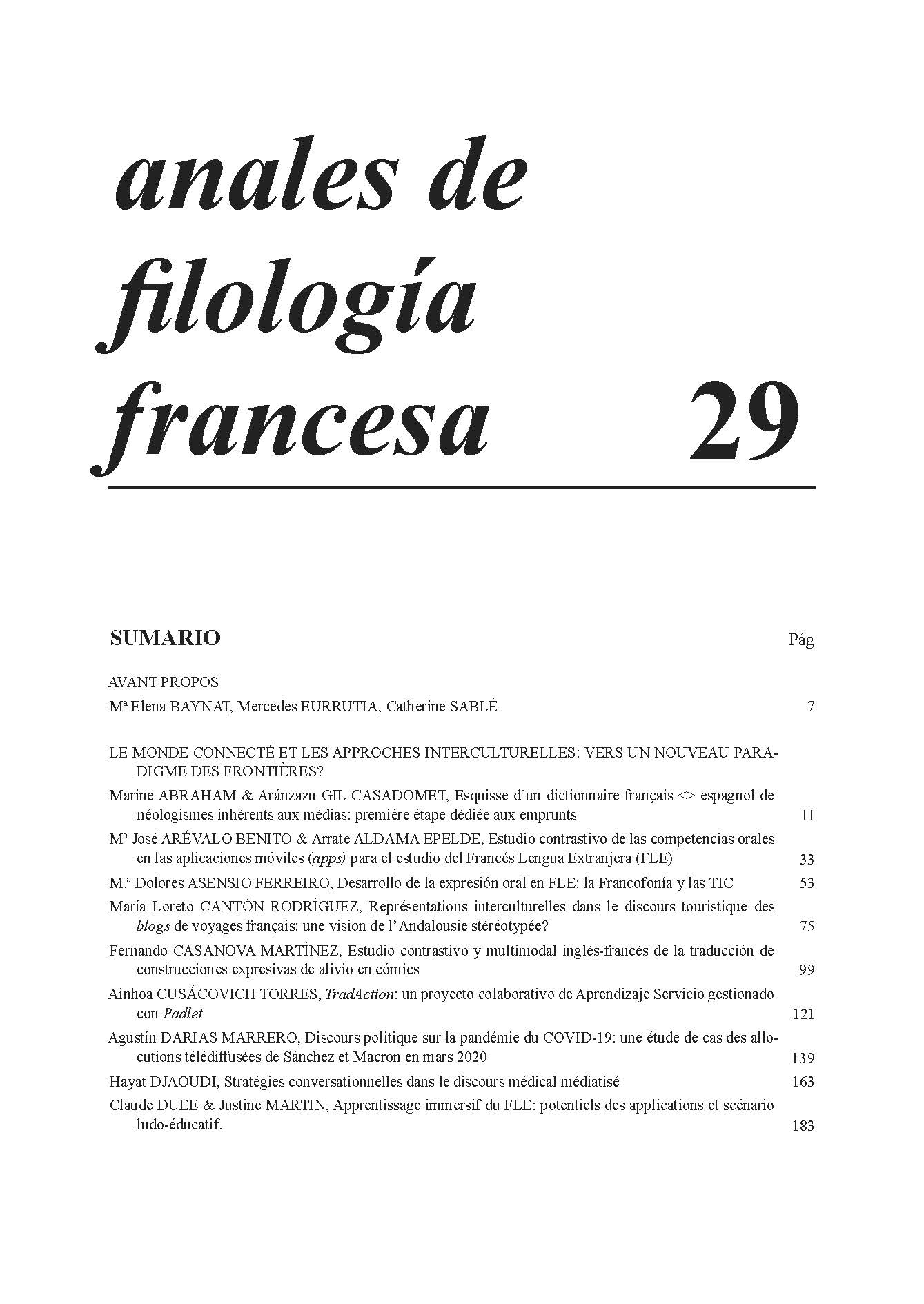LMOOCs to integration of displaced people
Abstract
One of the main challenges faced by displaced people is dealing with the linguistic and cultural barriers that arise from the lack of knowledge, in most cases, of the language and culture of the destination country. At present, thanks to Information and Communication Technologies (ICTs), there are numerous resources and applications that can help to alleviate these deficiencies, before, or during the period in which mobility develops. In this article we present some of them. More specifically, this article focuses on the MOOC (Massive Open Online Courses) format for foreign language learning (LMOOC). We will analyze two LMOOCs for learning Spanish as a Foreign Language (SFL) aimed mainly at migrants and refugees; and three for learning French as a Foreign Language (FFL) aimed mainly at people displaced for work or educational reasons.
Downloads
-
Abstract458
-
PDF (Español (España))572
References
Referencias bibliográficas
ACNUR. 1951. Convention and protocol relating to the status of refugees: <https://www.unhcr.org/uk/1951-refugee-convention.html> [31/05/2021].
ACNUR. 2020. Tendencias globales de desplazamiento forzado en 2019: <https://www.acnur.org/5eeaf5664.pdf> [31/05/2021].
ALLIANCE FRANÇAISE PARIS-ÎLE-DE-FRANCE. 2019. LMOOC Travailler en France A2-B1: <https://www.fun-mooc.fr/fr/cours/travailler-en-france-a2-b1/> [31/05/2021].
ANQUETIL, Mathilde. 2006. Mobilité Erasmus et communication interculturelle. Berna, Peter Lang.
ARÚS HITA, Jorge. 2019. “Puertas Abiertas: MOOC de lenguas adaptado a las necesidades de migrantes y refugiados” in V Jornadas ELE: las TIC en la enseñanza de ELE, Universidad Complutense de Madrid, 19-20 marzo 2019.
BÁRCENA MADERA, Elena & Elena MARTÍN-MONJE. 2014. “Introduction. Language MOOCs: An emerging field” in Martín-Monje, Elena & Elena Bárcena Madera (Eds.). Language MOOCs: Providing learning, transcending boundaries. Berlin, De Gruyter, 1-15.
CASALLAS HERRERA, Miguel Ángel. 2021. “Internacionalización de la Educación Superior: más allá de la movilidad académica” in Guerrero Escobar, Javier Iván (comp.) Internacionalización del currículo y experiencias pedagógicas. Pertinencia y aprendizaje global en educación superior. Bogotá, UNIMINUTO, 57-89.
CASTRILLO, María Dolores & Elena MARTÍN-MONJE. 2018. “Integración Lingüística de Refugiados e Inmigrantes a Través de Los MOOC” in XXXVI CONGRESO AESLA Lingüística aplicada y transferencia del conocimiento: empleabilidad, internacionalización y retos sociales: <https://cutt.ly/nnRzpit> [31/05/2021].
COLLIER, Paul & Alexander BETTS. 2017. “Why denying refugees the right to work is a catastrophic error” in The Guardian: <https://cutt.ly/ynRzh3r> [31/05/2021].
COMISIÓN EUROPEA. 2020. Erasmus + annual report 2019: <https://ec.europa.eu/programmes/erasmus-plus/about/statistics_es> [31/05/2021].
CONSEIL DE L’EUROPE. 2001. Cadre européen commun de référence pour les langues. Paris, Les Éditions Didier.
ÉCOLE POLYTECHNIQUE DE PARIS. 2021. LMOOC Étudier en France: French Intermediate B1-B2: <https://fr.coursera.org/learn/etudier-en-france> [31/05/2021].
ILOSTAT. 2018. ILO Global Estimates on International Migrant Workers. Results and Methodology: <https://cutt.ly/8nRzzLi> [31/05/2021].
LÓPEZ ESTEBAN, Carmen & Fernando E. ALMARAZ MENÉNDEZ. 2020. “Migración, desplazamiento y educación universitaria: el reconocimiento de competencias y cualificaciones del profesorado” in Aulas Innovadoras en la Formación de los Futuros Educadores de Educación Secundaria. Salamanca, Ediciones Universidad Salamanca, 95-113.
MARTÍN-MONJE, Elena, María Dolores CASTRILLO & Beatriz SEDANO CUEVAS. 2019. “Language MOOC Design for Social Inclusion through the Lens of Maker Culture” in CALICO Conference 2019. <https://cutt.ly/knULHEM> [31/05/2021].
ORGANIZACIÓN DE LAS NACIONES UNIDAS. 2015. Objetivos de Desarrollo Sostenible: <https://cutt.ly/qnULVr8> [31/05/2021].
PERNÍAS PECO, Pedro & Sergio LUJÁN MORA. (2013). “Los MOOC: orígenes, historia y tipos” in Centro de Comunicación y Pedagogía: <http://www.centrocp.com/los-mooc-origenes-historia-y-tipos/> [31/05/2021].
READ, Timothy, BÁRCENA MADERA, Elena, ARÚS, Jorge y Beatriz SEDANO CUEVAS. 2017. “The Potential of Language MOOCs for the Social Inclusion of Displaced People”, Conference Language Skills for Social and Economic Inclusion. Berlín.
SANZ GIL, Mercedes. 2020. “MOOC para comprender la interculturalidad de lo cotidiano” in Baynat Monreal, Mª Elena, Mercedes Eurrutia Cavero & Catherine Sablé (eds.). TIC e Interculturalidad. Miradas Cruzadas. Granada, Editorial Comares (col. Interlingua), 323-345.
SEDANO CUEVAS, Beatriz. 2017. “Español para Viajeros”: Diseño de un MOOC de Lenguas a partir del análisis de necesidades formativas en el dominio turístico. Tesis doctoral, Universidad Nacional de Educación a Distancia.
SIEMENS, Georges. 2004. “Conectivismo: Una teoría de aprendizaje para la era digital”: <https://cutt.ly/nuLOvUH> [31/05/2021].
UNIVERSIDAD NACIONAL DE EDUCACIÓN A DISTANCIA. 2021. LMOOC Puertas abiertas: curso de español para necesidades inmediatas I: <https://iedra.uned.es/courses/course-v1:UNED+PuertasAbiertasI+2021/about> [31/05/2021].
UNIVERSIDAD NACIONAL DE EDUCACIÓN A DISTANCIA. 2021. LMOOC Puertas abiertas: curso de español para necesidades inmediatas II: <https://iedra.uned.es/courses/course-v1:UNED+PuertasAbiertasII+2021/about> [31/05/2021].
UNIVERSITÉ DE GRENOBLE ALPES. 2021. LMOOC Mooc2Move: le français pour l’Université: <https://www.fun-mooc.fr/fr/cours/mooc2move/> [31/05/2021].
Las obras que se publican en esta revista están sujetas a los siguientes términos:
1. El Servicio de Publicaciones de la Universidad de Murcia (la editorial) conserva los derechos patrimoniales (copyright) de las obras publicadas, y favorece y permite la reutilización de las mismas bajo la licencia de uso indicada en el punto 2.
2. Las obras se publican en la edición electrónica de la revista bajo una licencia Creative Commons Reconocimiento-NoComercial-SinObraDerivada 3.0 España (texto legal). Se pueden copiar, usar, difundir, transmitir y exponer públicamente, siempre que: i) se cite la autoría y la fuente original de su publicación (revista, editorial y URL de la obra); ii) no se usen para fines comerciales; iii) se mencione la existencia y especificaciones de esta licencia de uso.
3. Condiciones de auto-archivo. Se permite y se anima a los autores a difundir electrónicamente las versiones pre-print (versión antes de ser evaluada) y/o post-print (versión evaluada y aceptada para su publicación) de sus obras antes de su publicación, ya que favorece su circulación y difusión más temprana y con ello un posible aumento en su citación y alcance entre la comunidad académica. Color RoMEO: verde.










